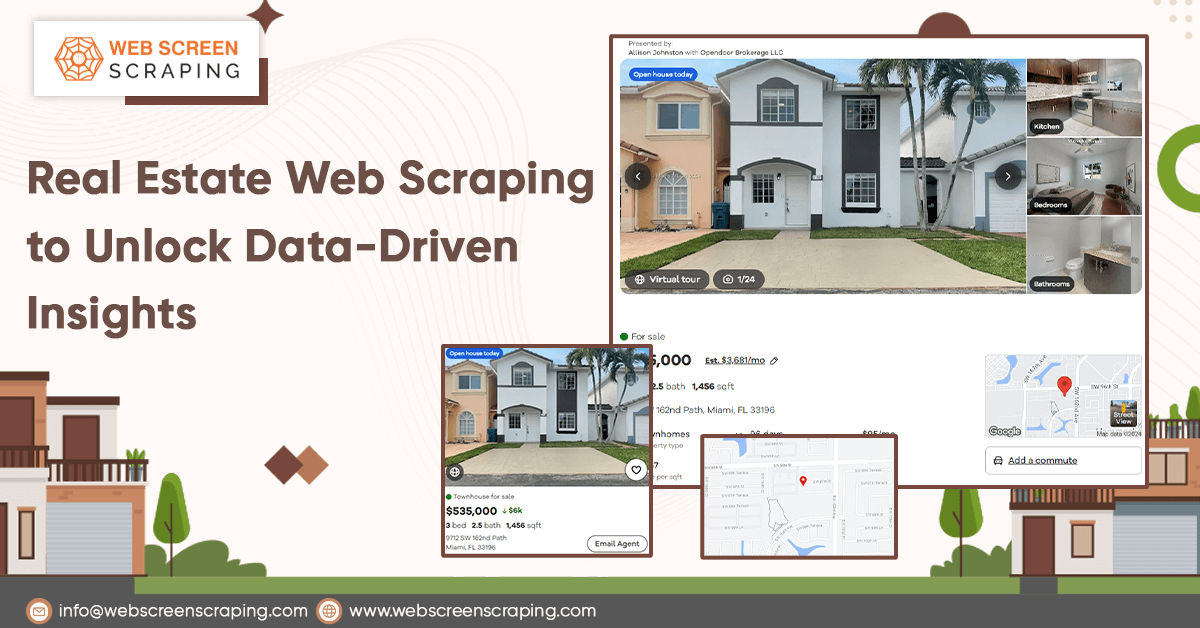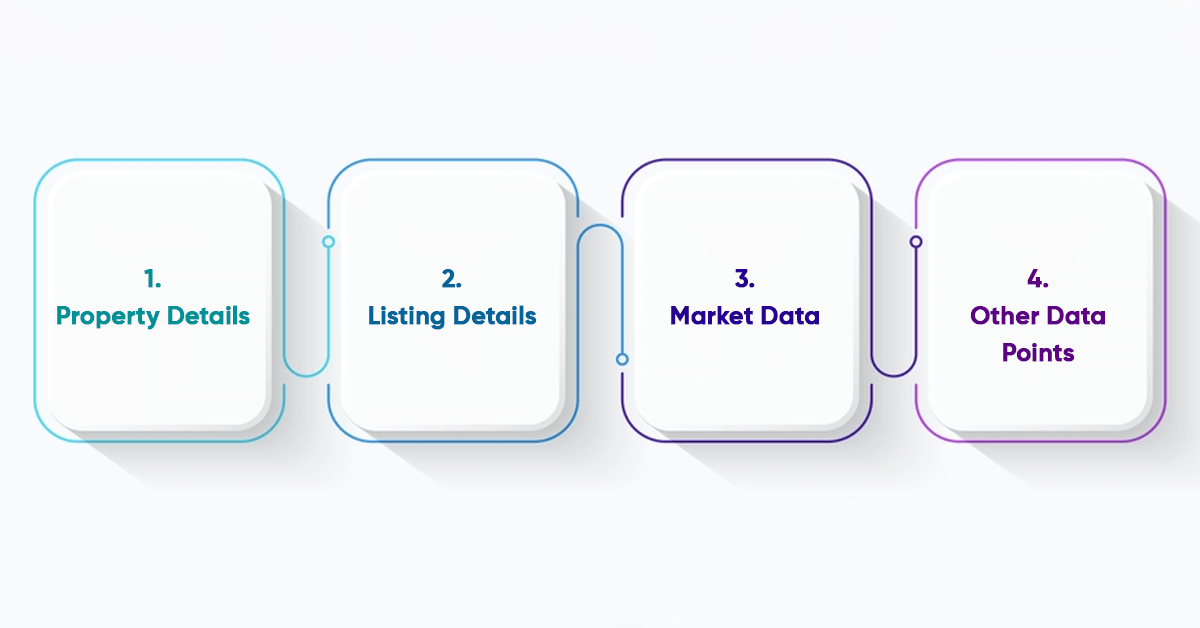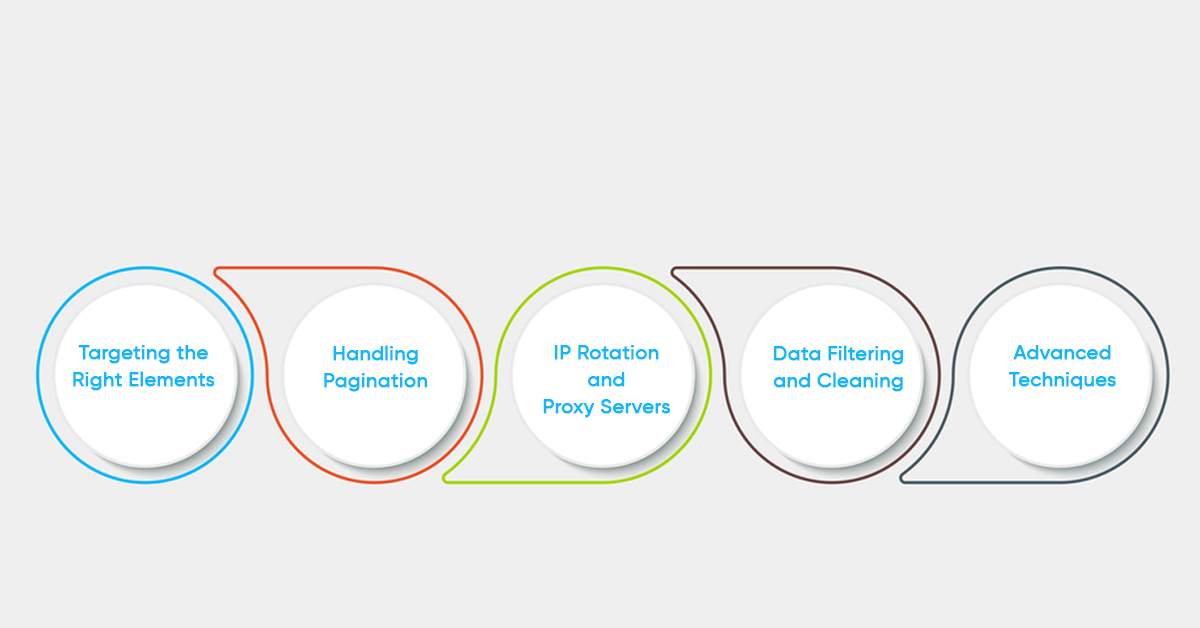
In the real estate world, having the correct information at the right time is everything. Having property trends, market data and rental analysis at your fingertips without drowning in a sea of data helps companies maintain a competitive edge in the market. Web scraping is the secret tool that unlocks the treasure trove of data in real estate. This blog will equip you with everything you need to know about Real Estate Web Scraping techniques, ethical practices and how to gather real-time trends that will transform your hustle from spreadsheets.
What is real-estate web scraping?
Real estate web scraping is the process of automatically extracting data from property listing websites. This data can include details like the size of the property, its number of bedrooms, the extra features it offers, the asking price, the price it sold for in the past, and pictures of the property.
There are a few reasons why someone might use real-estate web scraping. Here are a couple of common use cases:
- Real estate professionals: They can use scraped data to find properties that are a good fit for their clients, track market trends, and analyze competitor pricing.
- Investors: Investors can use web scraping to identify potential investment opportunities and better understand the real estate market in a particular area.
Why scrape real estate data?
There are several reasons why people scrape real estate data:
Gain Market Insights
The real estate market is constantly shifting. Web scraping allows you to collect a ton of data to analyze trends. This data can help you understand things like:
- Market Direction: Is the market expected to rise or fall?
- Property Values: How much are similar properties going for in a specific area?
- Ideal Buying/Selling Times: When might be the best time to buy or sell in a particular market?
Make Informed Decisions
With a clearer picture of the market, you can make better choices. This applies to:
- Investors: Choose properties with higher potential return on investment (ROI)
- Real Estate Agents: Develop targeted marketing campaigns and price properties competitively
- Home Buyers/Sellers: Find the best deals and negotiate effectively
Build Real Estate Aggregators
Many websites compile real estate listings from various sources. Web scraping helps them gather this data efficiently and offers a one-stop shop for property searches.
Identify Customer Needs
Analyzing scraped data can help you understand the most popular property demand. This can be valuable for developers and builders who want to construct properties that will sell quickly.
What are the types of real estate data that can be scraped?

Several categories of real estate data can be scraped from various websites. Here's a breakdown:
Property Details
- Basic information: This includes address, location (city, neighbourhood), property type (house, condo, apartment), number of bedrooms and bathrooms, square footage, lot size, year built, and HOA fees (if applicable).
- Description: Scraped data can include details from the property description, highlighting features like amenities (pool, gym, parking), architectural style (colonial, modern), renovations, and unique features.
Listing Details
- Price: This can include current listing price, historical pricing data (if available), and rental prices (if applicable).
- Status: Scrapable data can include details on whether a property is for sale, rent, or already under contract.
- Agent Contact Information: This might include the listing agent's name, contact details, and brokerage information.
Market Data
- Sales data: This includes information on recently sold properties in a specific area, including sale price, date of sale, and property characteristics.
- Rental data: In areas with a strong rental market, scraping can target data on average rental prices, vacancy rates, and lease terms.
Other Data Points
- Public records (with proper legal access): While not directly scraped from real estate websites, some data can be gleaned from public record sources. This might include tax information, property history, and permits filed for renovations.
- Demographic data: Although not specific to the property itself, demographic data from public sources can be valuable. This could include a neighbourhood's average income, school district ratings, and crime rates.
Methods to scrape real estate data
There are two main approaches to scraping real estate data:
Building your scraper
- This method involves writing code to automate navigating real estate websites and extracting data. Popular programming languages for web scraping include Python and Javascript.
- Libraries like BeautifulSoup (Python) and Cheerio (JavaScript) can simplify parsing HTML code and extracting relevant data points.
- Advantages: Offers more control and customization over the scraping process.
- Disadvantages: Requires programming knowledge and ongoing maintenance as websites can change their structure.
Using web scraping tools and APIs
- Several web scraping tools and APIs can simplify the data collection process. These tools often have user-friendly interfaces and don't require coding knowledge.
- Pre-built Scrapers: Some tools offer pre-built scrapers specifically designed for popular real estate websites.
- Web Scraping APIs: These services provide programmatic access to scraped data from various websites through an API (Application Programming Interface).
- Advantages: Easier to use and often faster than building your scraper.
- Disadvantages: There may be limitations on the data you can scrape or costs associated with using the service.
Web scraping techniques for real estate data

Here are some of the general methods for scraping real estate data. The specific implementation will depend on the chosen tools and the website structure you're targeting.
Targeting the Right Elements
- HTML Inspection: Use your browser's developer tools to inspect the HTML structure of the real estate website. This will help identify the HTML tags and classes that contain the data you want to scrape.
- CSS Selectors: Once you've located the HTML elements containing your target data, use CSS selectors to target them precisely in your code. This ensures you extract only the relevant information.
Handling Pagination
- Most real estate websites display listings across multiple pages. Your scraping technique should be able to navigate through these pages. Look for patterns in URLs or HTML code to identify how pagination works and extract data from all relevant pages.
IP Rotation and Proxy Servers
- Websites may throttle or block scraper traffic to prevent overload. To avoid this, techniques like IP rotation can be used where scrape requests appear to originate from different IP addresses. Proxy servers can also be used to mask your scraper's IP address.
Data Filtering and Cleaning
- Scraped data might contain irrelevant information or inconsistencies. Use data filtering techniques to remove unwanted data and clean the extracted information to ensure accuracy and consistency in your dataset.
Advanced Techniques
- JavaScript Rendering: Some websites rely on JavaScript to render content dynamically. Libraries like Selenium can be used to automate browser actions and scrape data that's only available after JavaScript execution.
- Headless Browsers: Headless browsers like PhantomJS can be scraped without opening a visible browser window. This can be useful for large-scale scraping tasks.
Ethical and legal considerations while scraping real estate data
Scraping real estate data can be a valuable tool, but it's important to approach it ethically and legally. Here are some key considerations:
- Focus on scraping publicly available information displayed on real estate websites. Avoid data hidden behind logins or requiring authorization.
- Look for a special file on the website called robots.txt. It tells you which parts of the site you shouldn't grab data from using tools like web scrapers.
- Review the website's TOS to ensure scraping doesn't violate any terms. Some websites may explicitly prohibit scraping.
- Be mindful of the website's capacity. Don't overload the server with excessive scraping requests.
- If scraping personal information (like contact details), ensure compliance with data privacy regulations like GDPR (General Data Protection Regulation) or CCPA (California Consumer Privacy Act).
- While scraping public data is generally allowed, some content, like descriptions, may be copyrighted. Respect copyright restrictions.
Conclusion
Imagine effortlessly tracking trends, identifying undervalued properties, and staying ahead of the curve. While the process might seem complex, professional web scraping companies like Web Screen Scraping can be your secret weapon. They handle the technical nitty-gritty, delivering clean, valuable data tailored to your specific needs. This is your cue to ditch the spreadsheets and embrace data-driven strategies.

